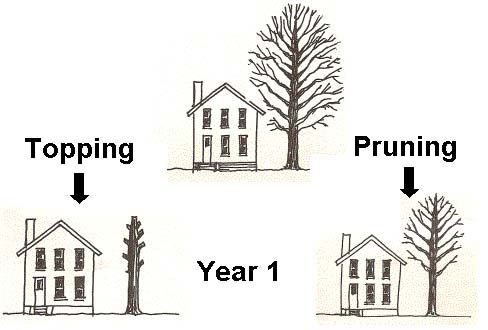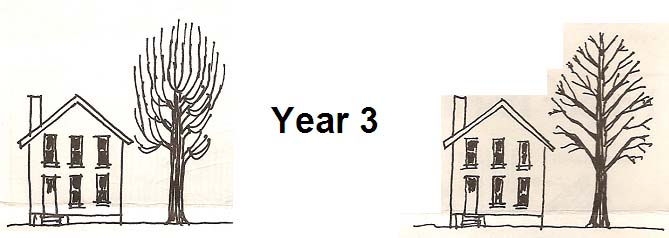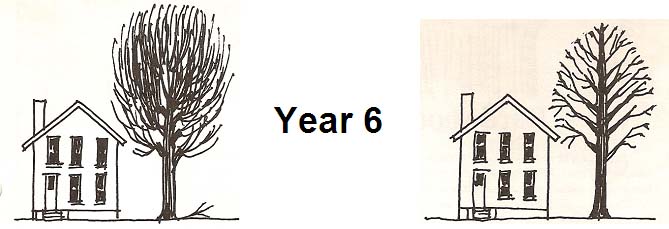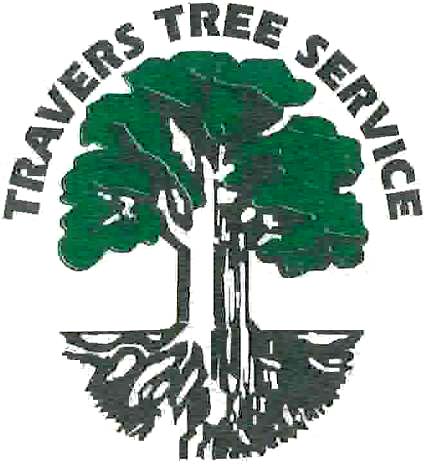Travers Tree Service
310-530-3920
Education
At Travers Tree Service our goal is to educate and advise our clients in all arboricultural matters. This section of the website is provided to describe the terminology used on our estimates, describe good tree care practices, and improve arboricultural understanding.
Common Terms
- Crown Cleaning
- Crown cleaning is the removal of dead, dying, diseased, crowded, weakly attached, and low-vigor branches and waterspouts from a tree crown.
- Crown Thinning
- Crown thinning includes crown cleaning and the selective removal of branches to increase light penetration and air movement into the crown.
- Crown Reduction
- Crown reduction is used to reduce the height and/or spread of a tree. This is the most artistic, technical, and time consuming procedure in arboriculture.
- Crown Restoration
- Crown restoration can improve the structure and appearance of trees that have been topped or severely pruned. This process may need to be repeated over many years depending on the condition of the tree.
- Crown Raising
- Crown raising removes lower branches of a tree in order to provide clearance for buildings, vehicles, pedestrians, and views. It is important that a tree have a least one-half of its foliage on branches that originate in the lower two-thirds of its trunk to endure a well-formed structure.
- Waterspout
- Sometimes called suckers, waterspouts are upright and numerous growths that result from improper pruning. Waterspouts form weakly attached branches that become a hazard as they grow larger.
- Removal
- Tree is cut as close to ground level as possible, leaving the tree stump in its place.
- Partial Stump Removal
- Tree stump is ground down six to eight inches below ground level. Primarily done for cosmetic reasons, the stump core will still be in the ground but not visible. For this reason, planting in the immediate area is not possible.
- Complete Stump Removal
- The tree stump and large visible roots are completely removed18 to 24 inches below ground level. This removal process will allow for new planting or construction in the area.
- Palm Tree Elevating
- The removal of dead fronds to a 45 degree angle on the trunk (no shaving, skinning, or sculpting on the trunk included).
- Palm Tree Skinning
- To carefully shave and remove all old "thatch work" leaving the trunk smooth in appearance. Usually a one-time project. Once this process is completed the trunk will remain smooth.
Topping vs. Pruning
When a decision is made
to reduce the size of an older tree, it can be topped or
pruned properly. Although the speed and
nature of regrowth will depend on species and local
factors, any comparison of irresponsible topping vs.
competent pruning will be dramatic. The topped tree is an
ugly stub and a remnant of a once lovely tree. If
pruned properly, size is reduced but form and beauty are
retained.
The topped tree is an
ugly stub and a remnant of a once lovely tree. If
pruned properly, size is reduced but form and beauty are
retained. Vigorous waterspouts have
sprung out of the topped tree in large numbers and are
growing with abnormal rapidity. The pruned tree
adds growth more slowly and more normally
distributed.
Vigorous waterspouts have
sprung out of the topped tree in large numbers and are
growing with abnormal rapidity. The pruned tree
adds growth more slowly and more normally
distributed.
 In a relatively short
time, the topped tree is as tall and far bushier and
more dangerous than it was to begin with. The
properly pruned tree is safer, more beautiful , and its
size is better controlled.
In a relatively short
time, the topped tree is as tall and far bushier and
more dangerous than it was to begin with. The
properly pruned tree is safer, more beautiful , and its
size is better controlled.
Tree Care Fundamentals
- Plant the right tree--90% of our tree removal requests are spawned by inappropriate tree selection. Let us help you determine the correct tree for your location.
- Trunk and Branches--Protect from physical damage (e.g. lawn mowers, weed eaters, vehicles). Keep water away from the trunk of the tree. Water allows fungus and other diseases to attack the tree.
- Roots--Most of a trees roots are within 12 inches of the soil surface and may extend out from the trunk as far as twice the height of the tree. With that in mind any construction or digging in that zone may impact the health of the tree. Tree roots do not grow well (or at all) in compacted, oxygen poor soil (e.g. under paved streets or sidewalks).
Tree Care Links
International Society of Arboriculture
Contact us for more information at tts@traverstree.com
Office: (310) 530-3920
Fax: (310) 534-3020


© 2007 Travers Tree Service All Rights Reserved.